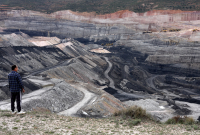Support strong Canadian climate journalism for 2025
An oil and gas company owned by the Canada Pension Plan Investment Board (CPPIB) was recently given the green light to frack under designated wildlife areas in Ohio in a move that could undermine the retirement funds of Canadians.
As first reported by The Associated Press in late February, Texas-based Encino Energy was awarded rights to frack under the Valley Run Wildlife Area and the Zepernick Wildlife Area by the Ohio Oil and Gas Land Management Commission — even as the commission is being investigated by the state’s attorney general’s office over using potentially fraudulent letters of support. Encino Energy is 98 per cent owned by the CPPIB.
The commission was flooded with letters of support from the public urging it to allow oil and gas extraction under state parks, but investigative reporting from Cleveland.com in September found dozens of letters were sent by Ohio residents who were unaware their names were being used. One was ostensibly sent by a nine-year-old girl whose name, email address and home address were used on a letter encouraging the commission “to remember the benefits responsibly leasing state land will provide.” The child’s mother told Cleveland.com that the girl “definitely did not submit that draft.”
The reporting traced the letters back to a pro-oil and gas group called the Consumer Energy Alliance, which denied its involvement. Responding to the allegations, a spokesperson for the group said it will work closely with authorities.
The controversy promises to cast a shadow over the CPPIB’s fossil fuel investment decisions, says Shift Action for Pension Wealth and Planet Health senior manager Patrick DeRochie. In an interview with Canada’s National Observer, he said the CPPIB’s ownership of Encino Energy fits a “troubling ongoing pattern” of the pension plan’s companies increasing fossil fuel extraction at the expense of climate action.
“I think many Canadians would be shocked and disappointed if they learned our national retirement fund is being used to frack for oil and gas underneath a protected wildlife area,” he said. “And it just really begs the question: What in the world is CPPIB doing with our collective retirement savings and not telling us about it?”
The CPPIB did not return a request for comment. However, the CPPIB has committed to net zero and said rather than divest its portfolio of fossil fuels, it will “exert our influence” as “active investors.”
DeRochie took issue with the board’s “almost ideological aversion to fossil fuel exclusion” policies as the pension plan casts itself as an active investor helping companies decarbonize.
“If they are active investors and do want to steward these companies in line with the Paris Agreement, then why are they choosing to expand fracking underneath protected wildlife areas right next door to Canada?” he said. “None of this lines up.”
A recent analysis of Canadian pensions from Shift found the CPPIB is one of the only major pension funds that has not yet set interim emission reduction targets. Shift found the lack of interim targets to be at odds with the Paris Agreement because the climate science is clear that there must be significant emission reductions by 2030 if the world is to avoid catastrophic warming.
Of the 12 directors on the CPPIB’s board, four currently also sit on the boards of directors of fossil fuel companies. For DeRochie, that “entanglement” at the very least creates a perception of a conflict of interest.
“The interests of the shareholders of fossil fuel companies are very different from the interests of the members of the pension plan,” he said. “And we don't know how those directors are separating those two things when they come to the CPPIB's boardroom table and make a decision on an investment or climate policy or their approach to net zero.”
Pension funds are mandated to protect its members’ retirement savings, and that legal duty applies equally to members collecting payments and those still decades away from retirement, DeRochie explained.
“Encino's expansion of fracking — while it may seem to be a good short-term decision for an oil and gas company — is actually undermining the long-term stability of the fund because it's contributing to the climate crisis,” he said.
“With every tonne of carbon that is going up into the atmosphere from oil and gas production, they are creating greater climate risk to their portfolio — and this is a portfolio of real estate assets, of infrastructure assets, of companies all over the world that will be impacted by the worsening impacts of climate change.”
According to Shift, not only has the CPPIB not yet acknowledged the necessity of phasing out fossil fuels or limiting its fossil fuel investments, last year it increased its exposure to the oil and gas sector, effectively upping the risk of stranded assets through the energy transition.






Comments
As a pensioner receiving benefits from one of the better run pensions for public service employees, I am afraid to inquire too closely into their portfolio in case it includes fossil fuel and adjacency entities. My impression is they invest largely in solid infrastructure and real estate but....
I have spent years haggling with my advisor to shift my paltry portfolio into more sustainable investments. Alas, everywhere we look up looms climate villains, including banks and other financial entities, which if not directly connected, are nevertheless part of the financial malfeasance that drives sickening inequality. The tar brush spreads its toxins widely indeed.
Shiftaction.ca has a letter-writing campaign, asking pension funds to vote their bank shares in accordance with protecting our retirement savings and the planet. Just click on the ACTION tab. There's a drop-down selector for your pension.